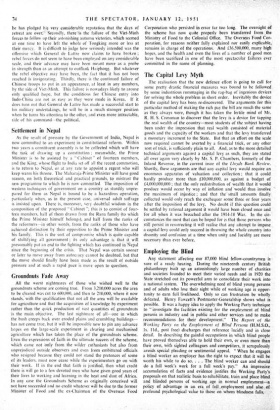Employing the Blind
Any statement affecting our 87,000 blind fellow-countrymen is sure of a ready hearing. During the nineteenth century British philanthropy built up an astonishingly large number of charities and societies founded to meet their varied needs and in 1920 the State stretched out its powerful arm to consolidate their work into a national system. The overwhelming need of blind young persons and of adults who lose their sight while of working age is oppor- tunity to earn full livelihood. Only so can frustration be wholly defeated. Henry Fawcett's Postmaster-Generalship shows what is possible. It was a happy idea to apply the Working Party technique to "investigate the facilities existing for the employment of blind persons in industry and in public and other services and to make recommendations for their development." The Report of the Working Party on the Employment of Blind Persons (H.M.S.O., Is. 11d., post free) discharges that reference lucidly and in close detail. In describing the gainful occupations in which blind people have proved themselves able to hold their own, or even more than their own, with sighted colleagues and competitors, it scrupulously avoids special pleading or sentimental appeal. "When he engages a blind worker an employer has the right to expect that it will be worth his while to do so. . . . The blind worker can and should do a full week's work for a full week's pay." An impressive accumulation of facts and evidence justifies the Working Party's proposals on that realistic basis to rehabilitate, train and place blind and blinded persons of working age in normal employment—a policy of advantage in an era. of full , employment and also of profound psychological value to those on whom blindness falls.


































 Previous page
Previous page